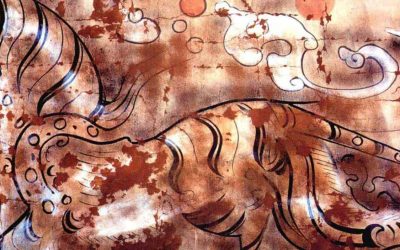The tiger hero of the Naxi[1]
A long time ago, a man named Gaoqu Gaobo lived in the Baoshan area. He had a strong body, lively intelligence, and certain magical powers. He was always willing to help people. One day he went on a trip with a group of villagers. After a while, they ran out of supplies. Faced with the risk of everyone starving to death, Gaoqu Gaobo decided to go into the forest to look for some food, instructing his fellow travelers that if they saw any animal leaving the forest call him by his name.
Then he entered into the forest alone. After a while, when he had moved a bit away from the people, he suddenly began to tremble and became a tiger. Then he gave a great roar and went looking for prey. It didn’t take long for him to find a deer and throw himself at it killing it in a moment. Then, carrying it in his mouth, he set out from the forest to the place where his fellow travelers were waiting. But when they heard the tremendous roar of the tiger, they were frightened and leave the camp, remaining only one boy there.
When he saw a tiger coming out with a deer in its mouth, he remembered Gaoqu Gaobo’s instructions and shouted his name. At that moment he became a person again. «Thank you. If you hadn’t shouted my name I wouldn’t have been able to become a person again.» Gaoqu Gaobo told him. The other travelers also returned and together they ate the deer.
The news of this extraordinary event soon reached the ears of King Mu[2], who called Gaoqu Gaobo to see if what they were telling was true. So the hero left his home, mounted his horse, and headed for Lijiang. When Gaoqu Gaobo arrived before the king, he presented himself without any special bow: «I am Gaoqu Gaobo from Baoshan, I came because you sent for me.» The king looked at him curiously and when he saw his simple clothes and a goatskin[3] on his shoulders, he looked at him with contempt.
Angry, Gaoqu Gaobo cast a spell and the king’s wife and children, who were eating at the time, stood still, their bowls and chopsticks falling to the ground. The king then realized that Gaoqu Gaobo was really a person with special powers. So when the hero set out on his way home, thinking that as long as there was such a person could be a danger to his power, he sent two of his guards behind him with instructions to kill him.
When Gaoqu Gaobo passed over a stone bridge, the henchmen, taking advantage of his unpreparedness, attacked him from behind cutting off his head and fleeing. Gaoqu Gaobo bowed his body and stepped down from the horse. With his hands, he took the head that had rolled on the floor and placed it in front of his chest. Then he went on his way waiting for a good moment to put his head on his neck in its proper place. Unfortunately, before he had a chance to accomplish his goal, his horse stumbled on some branches, causing him to fall to the ground. This time the head was quite far from the body and he could not reach it. Thus came death to Gaoqu Gaobo.
When people heard of his death, they wouldn’t stop crying. Very sad, they performed a funeral and incinerated his body. Soon after, they built a temple in his honor and began to regard him as a god who can put an end to people’s difficulties.
This and other myths of the Naxi in: The Creation of the World, the Deluge, and other Naxi myths
[1] Version published in Camelia magazine. 1982-3.
[2] The kings of the Mu family ruled the destinies of Lijiang from the 14th to the 18th century.
[3] Part of the traditional costume of the Naxi, although it is currently worn only by women.
Last posts
The art of laying out gardens among the Chinese
The art of laying out gardens among the Chinese In the 1740s, William Chambers travelled on three trading voyages to China with the Swedish East India Company. He was the first European to study Chinese architecture methodically. In a book published in 1757, Designs...
The secret treasure of ancient Chinese art
The secret treasure of ancient Chinese art China has a fabulous artistic treasure hidden from the eyes of the public and specialists. It is her best kept treasure, because given the dispersion of its location, the difficulty of conservation and even evaluation and...
2,000-year-old paintings in a Chinese tomb
2,000-year-old paintings in a Chinese tomb It has been more than 10 years since the publication of The complete collection of murals unearthed in China, a dozen or so books describing with abundant full-color photographs the frescoes discovered in Chinese tombs....







